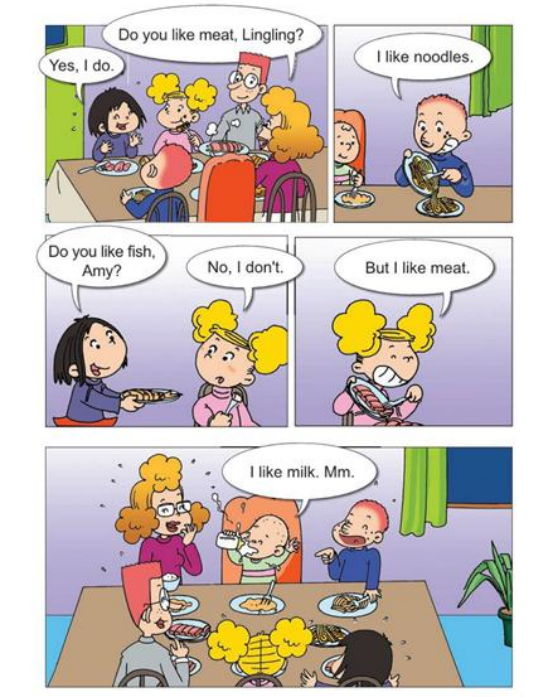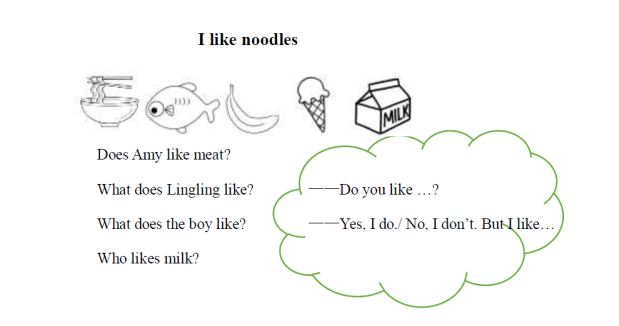关键词: 全国招教
教师面试如何打动考官?让你的试讲更有亮点,大量的实战练习必不可少,招教网更新——英语《I like noodles》
1.题目:I like noodles 对话教学
2.内容:

3.基本要求:
(1)试讲时间约10分钟,采用英语授课;
(2)根据教学内容设计导入环节;
(3)突出教学重点和难点,呈现对话教学的主要环节;
(4)配合教学过程适当板书。
试题解析教案
Teaching objectives:
1. Students can read, understand and use the sentences “Do you like…?”; “Yes, I do.” or “No, I don’t.”
2. Students’ speaking ability will be also improved by some activities.
Through group work, students can learn how to cooperate with others.
3.Students’ interests of learning English will be improved.
Key points:
Students understand the sentences “Do you like…?”; “Yes, I do.” or “No, I don’t.”
Students can use these certain expressions to communicate with others.
Difficult points:
Students can use the key sentences flexibly in different situations.
Teaching Procedure:
I. Revision/ Lead-in
Show some pictures of different kinds of food on the screen and ask students the names of the food. Talk more about the food such as their shapes, colors and tastes.
II. Presentation
1. Play the tape for students and ask them what the dialogue is about.
2. Students listen to the tape again and answer the following questions:
(1) Does Amy like meat?
(2) What does Lingling like?
(3) What does the boy like?
(4) Who likes milk?
3. The teacher shows students the picture of the dialogue and plays the tape for the third time. Students try to follow the tape with the help of the picture and imitate the pronunciation.
III. Practice
Activity 1 Ask and Answer
Show some pictures of different kinds of food on the screen again. Point at some kind of food and ask students “Do you like …?” guide students to answer with “Yes, I do/ No, I don’t. But I like…”
Activity 2 Pair Work
Students work in pairs to ask each other about their food preferences. Then the teacher invited several pairs to show their conversations.
IV. Consolidation
The New Year is coming. Four students in a group, talk about what they will do on the New Year’s Eve and what they are going to prepare for the New Year’s Eve dinner and explain why.
V. Summary
Students summarize what they have learnt in this lesson and the teacher gives supplement if necessary. Enlarge students’ knowledge about food and cultivate their love for traditional Chinese festivals.
VI. Homework
Students ask their friends about their likes and dislike after class.
VII. Blackboard Design

试题解析试讲稿
I. Lead-in
T: Good morning, boys and girls. Welcome back to school. Nice to see you, again.
Ss: Nice to see you, too.
T: How are you today?
S1: Fine, thank you.
T: How is weather today?
S2: It’s sunny.
T: Now, please look at the PPT. There are some pictures, please tell me “What’s this?”
S3: This is an apple.
T: Yes, and the apple is red, round and sweet. Wonderful! Any other students want to have a try?
S4: This is a pear.
T: Yes, and the pear is yellow, and sweet.
II. Presentation
Activity 1:
T: Now, I will play the tape and you have to listen to the tape carefully. After listening, please tell me what the dialogue is about. Do you understand?
S: Yes! OK! Let’s go!
T: The tape is over. Who can answer my question? You, please!
S: It talks about what they like to eat.
Activity 2:
T: Well done! And now, please listen to the tape again and answer the following questions:
(1) Does Amy like meat?
(2) What does Lingling like?
(3) What does the boy like?
(4) Who likes milk?
Do you understand?
Ss: Yes!
T: OK! Let’s go!
T: The tape is over, who can tell me the answer? Lily, please!
S: Amy likes meat.
T: Wonderful! What about the second one? Mike, you, please!
S: Lingling likes meat.
T: Great! What about the third one? Our monitor, please!
S: The boy likes noodles.
T: Great! What about the last one? Tom, please!
S: The baby likes milk.
Activity 3:
T: OK! Now, I will show you the picture of the dialogue and plays the tape for the third time. You should try to follow the tape with the help of the picture and imitate the pronunciation.
S:…
III. Practice
Activity 1 Ask and Answer
T: Now, please look at the PPT. There are some pictures of different kinds of food on the screen. I will point at some kind of food and ask you “Do you like …?” Then, you should answer with “Yes, I do/ No, I don’t. But I like…” Are you clear?
S: Yes!
T: OK! Let’s go!
T: Do you like meat?
S: Yes, I do.
T: Wonderful! Ok, next one! Do you like milk?
S: No, I don’t. But I like meat.
Activity 2 Pair Work
T: Next, you have to work in pairs to ask each other about your food preferences. Then I will invite several pairs to show your conversations. Clear?
S: …
T: Time flies! Who wants to give us a performance? You two, please!
S: …
T: Wow, your pronunciation is great! Thanks for sharing!
IV. Consolidation
T: Ok, next, let’s do a task! The New Year is coming. Four students should be in a group. You have to talk about what you will do on the New Year’s Eve and what you are going to prepare for the New Year’s Eve dinner and explain why. Are you clear? Ok, let’s go!
T: Time is up! Which group wants to have a try? Wow, Group B you are so brave! It is your show time!
S: I will make dumplings on the New Year’s Eve, because it is delicious!
T: Your performance is very careful!
V. Summary
T: Who can tell me what we have learned in this class?
S: We learned the sentence pattern and some new words.
T: Yes, but we also learned the importance of loving for traditional Chinese festivals.
VI. Homework
T: Today’s homework is to ask your friends about their likes and dislike after class. Class is over, bye!
VII. Blackboard Design

试题解析答辩
1.请说一说什么是零冠词以及它的用法。
【参考答案】
零冠词,即不用定冠词的情况,其用途比较广泛,不仅用于物质名词、抽象名词和专有名词前,而且经常用在集体名词和名词化的各种词类之前,变化也比较多。常用用法如下:
(1)国名、人名前通常不用定冠词。
例如:England 英国,Mary玛丽。
(2)泛指的复数名词,表示一类人或事物时,可不用定冠词。
例如:They are teachers. 他们是教师。
(3)抽象名词表示一般概念时,通常不加冠词。
例如:Failure is the mother of success. 失败乃成功之母。
(4)物质名词表示一般概念时,通常不加冠词。
例如:Man cannot live without water. 离开水人就无法生存。
2. What are the teaching key points and difficult points of this lesson?
【参考答案】
Key points:
Students understand the sentences “Do you like…?”; “Yes, I do.” or “No, I don’t.”
Students can use these certain expressions to communicate with others.
Difficult points:
Students can use the key sentences flexibly in different situations.
So, in order to overcome the difficult points, I will adopt different activities to attract their attention and try to make them enjoy English learning. By doing this, students are stimulated by the motivation to finish the task and they're applying the knowledge into practice.

2024年教师招聘官方微信客服
手机微信扫描左侧二维码,添加客服老师微信领取
相关推荐:
手机登录确认
微信扫码下载
微信扫一扫,即可下载